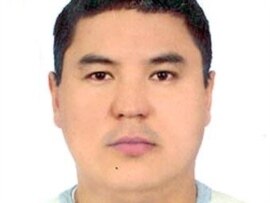Alleged Kyrgyz criminal authority detained in Abu Dhabi
| Publisher | Radio Free Europe/Radio Liberty |
| Publication Date | 21 July 2011 |
| Cite as | Radio Free Europe/Radio Liberty, Alleged Kyrgyz criminal authority detained in Abu Dhabi, 21 July 2011, available at: https://www.refworld.org/docid/4e39056f23.html [accessed 31 May 2023] |
| Disclaimer | This is not a UNHCR publication. UNHCR is not responsible for, nor does it necessarily endorse, its content. Any views expressed are solely those of the author or publisher and do not necessarily reflect those of UNHCR, the United Nations or its Member States. |
July 21, 2011
 Kamchy Kolbaev
Kamchy Kolbaev
BISHKEK – Alleged Kyrgyz criminal kingpin Kamchy Kolbaev has been apprehended in the United Arab Emirates (UAE), RFE/RL's Kyrgyz Service reports.
Kyrgyz Deputy Interior Minister Melis Turganbaev told RFE/RL on July 21 that Kolbaev and another alleged crime figure, Almambet Anapiyaev, were arrested in Abu Dhabi in connection with unspecified crimes committed in the UAE.
Turganbaev said UAE police informed the Kyrgyz authorities by phone about the arrests.
Kolbaev is wanted in Kyrgyzstan for organized and transnational criminal activities.
He was among seven people added by U.S. President Barack Obama on June 2 to a list of foreign individuals subject to U.S. sanctions. The move means U.S. companies and individuals are barred from doing business with Kolbaev.
The Kyrgyz authorities say Kolbaev heads one of the country's main organized crime networks, engaging in activities ranging from drug trafficking to extortion and attempted murder.
Last month, Turganbaev told RFE/RL that Kolbaev has ties to a brother of former President Kurmanbek Bakiev, who was ousted in April 2010. He did not specify which of Bakiev's five brothers.
The U.S. Treasury Office lists Kolbaev's aliases as Kamchi Bishkeksky and Kolya-Kyrgyz, and says he was born in the northeastern Kyrgyz city of Cholpon Ata in August 1974.
Malohat Eshonqulova told RFE/RL on July 15 that she decided to end her hunger strike after 19 days after she started spitting up blood and could not lift her head.
Eshonqulova added that another reason for ending her strike was that her hospitalized mother-in-law has lapsed into a coma.
Eshonqulova's colleague, Saodat Omonova, ended her hunger strike on July 12 after being forcibly hospitalized.
Eshonqulova said that once they had recovered they wanted to issue an official statement regarding their hunger strike to international organizations, human rights groups, and journalists.
Omonova and Eshonqulova were detained in Tashkent on June 27 – which is Media Workers' Day in Uzbekistan – when they tried to start a hunger strike outside President Islam Karimov's residence.
They were arrested, and a Tashkent district court fined them 2.94 million soms (about $1,500) for holding an unauthorized protest.
The two women were seeking a meeting with Karimov to discuss media censorship at the Yoshlar (Youth) TV station, from which they were both dismissed in December, three days after staging a protest on Tashkent's main square against media censorship.
They filed a lawsuit for wrongful dismissal against the management of Yoshlar, but on May 31 a district court ruled in favor of the TV station, saying the women's dismissal was legal. They have appealed that verdict.
Eshonqulova told RFE/RL that since May 2 they have sent 56 letters to Karimov detailing examples of censorship at Yoshlar and requesting a meeting with him. But they have received no response.
Kyrgyzstan's AKI Press news agency reported that on July 17, a 45-year-old ethnic Kyrgyz taxi driver was knifed by a local Uzbek. Some 500 local Kyrgyz gathered in Aravan's central market on July 18 to demand an investigation into the incident.
Aravan district head Paizilla Myrzabaramov told RFE/RL that the authorities had the situation under control and the crowd had dispersed.
Aravan is on the border with Uzbekistan about 23 kilometers west of the city of Osh. Its population is predominantly ethnic Uzbek.
More than 400 people were killed, hundreds injured, and many thousands left homeless in fighting one year ago between Uzbeks and Kyrgyz in the Osh and Jalal-Abad regions.
On September 3, 2010, Akmal Karimov drove a car packed with explosives into the main gate of the headquarters of the Anti-Organized Crime Police Directorate in the northern city of Khujand, killing himself and three others and injuring 28 people.
It was the first-ever such suicide bombing reported in Tajikistan.
Karimov's brother, Firdavs Karimov, is one of the 53 suspected IMU members who are accused of planning and participating in the attack.
Forty of the suspects are residents of the town of Istravshan in Sughd Province. One of them is under 18, according to the 20 lawyers who are defending the group.
Suicide bomber Akmal Karimov was born in Istravshan but lived in Khujand. Officials say Karimov was charged with kidnapping in 2009 but left the country and underwent training at terrorist camps in Afghanistan.
Yusuf Rahimov, the Sughd provincial prosecutor, told RFE/RL today he is confident that the charges of membership in a terrorist and extremist group will be proved during the trial.
Nekruz Hamzaaliev, a lawyer for suspects Shuhrat Ghafurov and Murodjon Quzibekov, told RFE/RL today that during the pretrial investigation all the suspects confessed their guilt but some may retract their confessions in court.
Hamzaaliev did not elaborate, but some local newspapers and human rights activists have accused the security forces of resorting to torture during the pretrial investigation in order to secure the confessions.
The trial in Khujand for the 53 suspects is being held behind closed doors.
Link to original story on RFE/RL website
